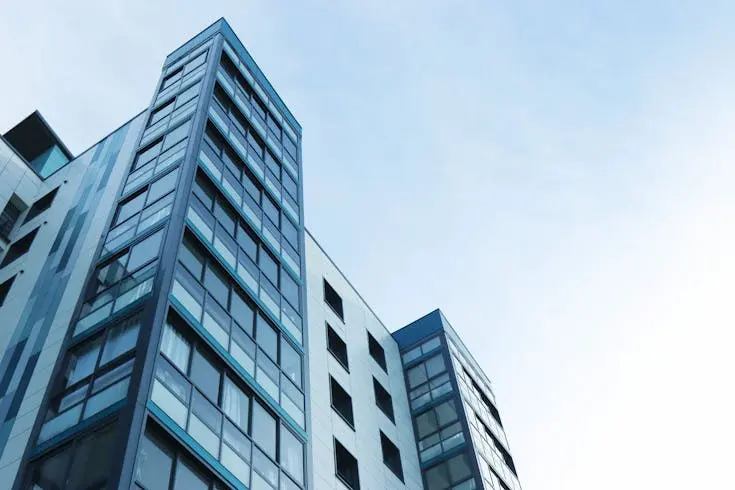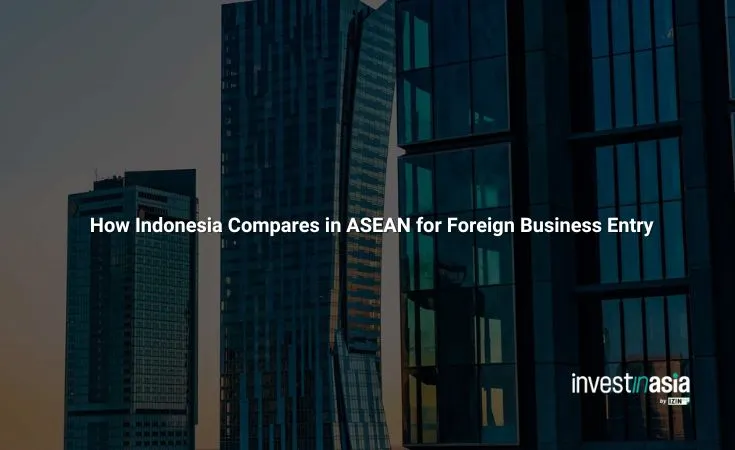Many foreign investors looking toward Southeast Asia ask themselves: which country provides the most strategic gateway for market entry? Indonesia strikes a compelling balance, more open than the Philippines and Thailand, but with strategic safeguards unlike ultra-liberal economies such as Singapore or Laos. The country has made significant strides, particularly with its 2021 Positive Investment List, which opened over 200 sectors to 100% foreign ownership.
If you’re considering market entry in ASEAN, Indonesia deserves serious attention, not just for its reforms, but for its unmatched economic scale and improving regulatory environment.
Also read: Why Indonesia Remains an Attractive Foreign Investment Destination
Foreign Ownership Policies: Indonesia Leads Mid-Tier Reformers


Indonesia adopted a “positive list” approach in 2021, where all sectors are open to foreign investors unless specifically restricted. This is more transparent than “negative list” models used in countries like Thailand and the Philippines.
- 100% ownership is permitted in most sectors.
- Sectors still closed include traditional media and cultural industries.
- Minimum capital of IDR 10 billion is required — higher than Singapore (none), but manageable for most serious investors.
Compared to peers:
- More liberal than Thailand (49% cap) and the Philippines (60% local ownership rule).
- Comparable to Vietnam (open sectors but with limits in finance).
- Less liberal than Brunei and Laos, but with better governance and economic scale.
Indonesia offers more predictable entry terms than many other ASEAN members thanks to clear rules and digital procedures.
Also read: How Incentives Encourage Investment in Indonesia in Times of Economic Instability
Sectoral Restrictions: Competitive Yet Protective
Banking & Finance:
Indonesia is one of the most open in ASEAN — allowing 100% foreign ownership in banks. This gives it an edge over Vietnam (30–49% cap) and Malaysia (case-by-case approvals).
Retail & Commerce:
Indonesia permits 100% ownership in retail if store size thresholds are met (e.g., supermarkets ≥ 1,200 sqm). While this limits SMEs, it suits larger foreign retailers.
Media & Cultural Industries:
Indonesia maintains strict protections — foreign investors are completely barred from traditional media and specific cultural sectors. This is more restrictive than Singapore and Thailand (both allow 49%).
Also read: Top Foreign Investment Sectors in Indonesia
Investment Screening: Streamlined and Transparent


Foreign investors can handle licensing and permit procedures digitally via the Online Single Submission (OSS) system. The system is:
- More predictable than discretionary systems in Myanmar or Cambodia.
- More transparent than Thailand’s license-based model.
- Aligned with regional leaders like Malaysia and Vietnam in regulatory structure.
OSS reduces red tape and boosts regulatory transparency, a key asset in ASEAN’s often fragmented legal environments.
Also read: Top Questions Foreigners Ask Before Registering a Business in Indonesia
Recent Reform Trends: Indonesia Ahead of the Curve
Indonesia’s 2021 reforms stand out across ASEAN:
- Transition from a Negative to Positive Investment List
- Liberalized over 200 sectors, including energy and telecom
- Integrated licensing via OSS
In contrast:
- Thailand’s reforms are planned for 2025.
- The Philippines is slowly easing its restrictions.
- Vietnam is still gradually liberalizing its banking sector.
Indonesia has emerged as a frontrunner among moderately open economies, striking a favorable balance between liberalization and regulatory oversight.
Economic Context: Investment is Responding
Indonesia’s efforts have paid off:
- FDI reached IDR 1,261.4 trillion (~$79.6B) in the first 9 months of 2024.
- In the second quarter of 2024, foreign capital accounted for 50.7% of the country’s total investment inflows.
- Indonesia holds the 27th position worldwide in the IMD World Competitiveness Rankings.
These numbers affirm that investors value Indonesia’s balance of openness, scale, and reform.
Why Choose Indonesia Over Other ASEAN Countries?
| Factor | Indonesia | Thailand | Philippines | Vietnam | Singapore |
|---|---|---|---|---|---|
| Foreign Ownership | 100% (most sectors) | 49% limit | 60% local share | Most sectors, limited in banking | Full |
| Licensing | OSS online system | Business license required | FINL approvals | Sectoral review | Liberal |
| Market Size | 280M people | 70M | 110M | 100M | 6M |
Comparing Indonesia’s FDI Incentives with Specific Countries in ASEAN
For a detailed comparison between Indonesia’s FDI incentives and those of other countries, you can read more at:
- Indonesia vs Singapore: Comparing The FDI Incentives
- Indonesia vs Malaysia: Which Offers Better FDI Incentives?
- Comparing FDI Incentives: Indonesia vs Vietnam
Bridging the Gap with InvestinAsia
Entering Indonesia’s market can be intricate, particularly due to capital thresholds, sector-specific conditions, and regulatory procedures. That’s where InvestinAsia’s Indonesia Company Registration Service steps in.
Why Use InvestinAsia’s Company Registration Services?
- Expert handling of foreign ownership and Positive List interpretations
- Guidance through OSS licensing procedures
- Support with sectoral-specific compliance
- Efficient processing that cuts weeks off your timeline
Whether you’re a tech startup or multinational, InvestinAsia ensures you enter Indonesia’s market with full legal clarity and strategic advantage.
Chat us now for FREE consultation and get a special offer!
Indonesia’s foreign business entry landscape is more accessible than ever, thanks to landmark reforms, digitized licensing, and a growing economy. While some restrictions remain, the country offers a balanced, investor-friendly climate that continues to evolve.
With strategic support from InvestinAsia, you can navigate the system with confidence — and tap into one of ASEAN’s most promising markets.
FAQs
Can a foreigner own 100% of a company in Indonesia?
Yes, in most sectors listed under the Positive Investment List, foreigners can fully own their business.
What is the minimum capital requirement for foreign investors in Indonesia?
The minimum is IDR 10 billion (~$700,000), with IDR 2.5 billion as paid-up capital.
How does Indonesia’s business environment compare to ASEAN countries?
Indonesia is more open than Thailand and the Philippines, on par with Vietnam, and slightly more regulated than Singapore.
Are there restrictions for media and cultural industries?
Yes. Foreign ownership is completely prohibited in traditional media, cultural preservation sectors, and batik manufacturing.
What is the OSS system in Indonesia?
The OSS platform serves as a unified digital system for managing all business licensing and permitting requirements in Indonesia.
References:
ABNR Counsellors at Law. Legal 500 Country Comparative Guides 2025. https://www.abnrlaw.com/files/document/InvestingIn20251.pdf.
Eria. ASEAN Foreign Trade, Investment, and Integration in Comparative Perspective. https://www.eria.org/3.2.ASEAN_50_Vol_3_Integrative_Chapters_2.pdf.




